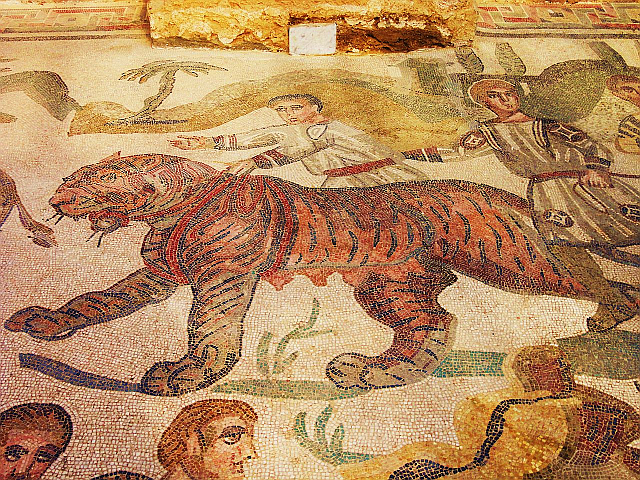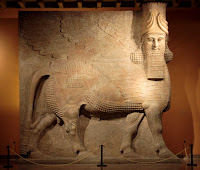Gabriel meets "Moloc" in Bk. 6.355:
Mean while in other parts like deeds deservd
Memorial, where the might of Gabriel fought, [ 355 ]
And with fierce Ensignes pierc'd the deep array
Of Moloc furious King, who him defi'd
And at his Chariot wheeles to drag him bound
Threatn'd, nor from the Holie One of Heav'n
Refrein'd his tongue blasphemous; but anon [ 360 ]
Down clov'n to the waste, with shatterd Armes
And uncouth paine fled bellowing.
We readers have met Moloc twice before. The first time was in Bk. 1 -- he got top billing as Satan's henchmen were identified as the pagan gods:

First Moloch, horrid King besmear'd with blood
Of human sacrifice, and parents tears,
Though for the noyse of Drums and Timbrels loud
Thir childrens cries unheard, that past through fire [ 395 ]
To his grim Idol. Him the Ammonite
Worshipt in Rabba and her watry Plain,
In Argob and in Basan, to the stream
Of utmost Arnon. Nor content with such
Audacious neighbourhood, the wisest heart [ 400 ]
Of Solomon he led by fraud to build
His Temple right against the Temple of God
On that opprobrious Hill, and made his Grove
The pleasant Vally of Hinnom, Tophet thence
And black Gehenna call'd, the Type of Hell. [ 405 ]
And again in Bk 2.43 ff, at the council in Pandemonium, Moloc argues for "open Warr":
He ceas'd, and next him Moloc, Scepter'd King
Stood up, the strongest and the fiercest Spirit
That fought in Heav'n; now fiercer by despair: [ 45 ]
His trust was with th' Eternal to be deem'd
Equal in strength, and rather then be less
Care'd not to be at all; with that care lost
Went all his fear: of God, or Hell, or worse
He reck'd not, and these words thereafter spake. [ 50 ]
My sentence is for open Warr: Of Wiles,
More unexpert, I boast not: them let those
Contrive who need, or when they need, not now.
For while they sit contriving, shall the rest,
Millions that stand in Arms, and longing wait [ 55 ]
The Signal to ascend, sit lingring here
Heav'ns fugitives, and for thir dwelling place
Accept this dark opprobrious Den of shame,
The Prison of his Tyranny who Reigns
By our delay? no, let us rather choose [ 60 ]
Arm'd with Hell flames and fury all at once
O're Heav'ns high Towrs to force resistless way,
Turning our Tortures into horrid Arms
Against the Torturer; when to meet the noise
Of his Almighty Engin he shall hear [ 65 ]
Infernal Thunder, and for Lightning see
Black fire and horror shot with equal rage
Among his Angels; and his Throne it self
Mixt with Tartarean Sulphur, and strange fire,
His own invented Torments. But perhaps [ 70 ]
The way seems difficult and steep to scale
With upright wing against a higher foe.
Let such bethink them, if the sleepy drench
Of that forgetful Lake benumm not still,
That in our proper motion we ascend [ 75 ]
Up to our native seat: descent and fall
To us is adverse. Who but felt of late
When the fierce Foe hung on our brok'n Rear
Insulting, and pursu'd us through the Deep,
With what compulsion and laborious flight [ 80 ]
We sunk thus low? Th' ascent is easie then;
Th' event is fear'd; should we again provoke
Our stronger, some worse way his wrath may find
To our destruction: if there be in Hell
Fear to be worse destroy'd: what can be worse [ 85 ]
Then to dwell here, driv'n out from bliss, condemn'd
In this abhorred deep to utter woe;
Where pain of unextinguishable fire
Must exercise us without hope of end
The Vassals of his anger, when the Scourge [ 90 ]
Inexorably, and the torturing hour
Calls us to Penance? More destroy'd then thus
We should be quite abolisht and expire.
What fear we then? what doubt we to incense
His utmost ire? which to the highth enrag'd, [ 95 ]
Will either quite consume us, and reduce
To nothing this essential, happier farr
Then miserable to have eternal being:
Or if our substance be indeed Divine,
And cannot cease to be, we are at worst [ 100 ]
On this side nothing; and by proof we feel
Our power sufficient to disturb his Heav'n,
And with perpetual inrodes to Allarme,
Though inaccessible, his fatal Throne:
Which if not Victory is yet Revenge. [ 105 ]
He ended frowning, and his look denounc'd
Desperate revenge, and Battel dangerous
To less then Gods.

Milton was surely aware of the Medieval and Renaissance sources for demons, including
grimoires like the
Pseudomonarchia Daimonum and
The Lesser Key of Solomon.
Asmodeus appears in these, but not Moloch.
Note the word that clings to Moloch. First he's the "furious King," then the "horrid King," and then, "the Scepter'd King."
Quite a bit about
him can be found in the Old Testament.







